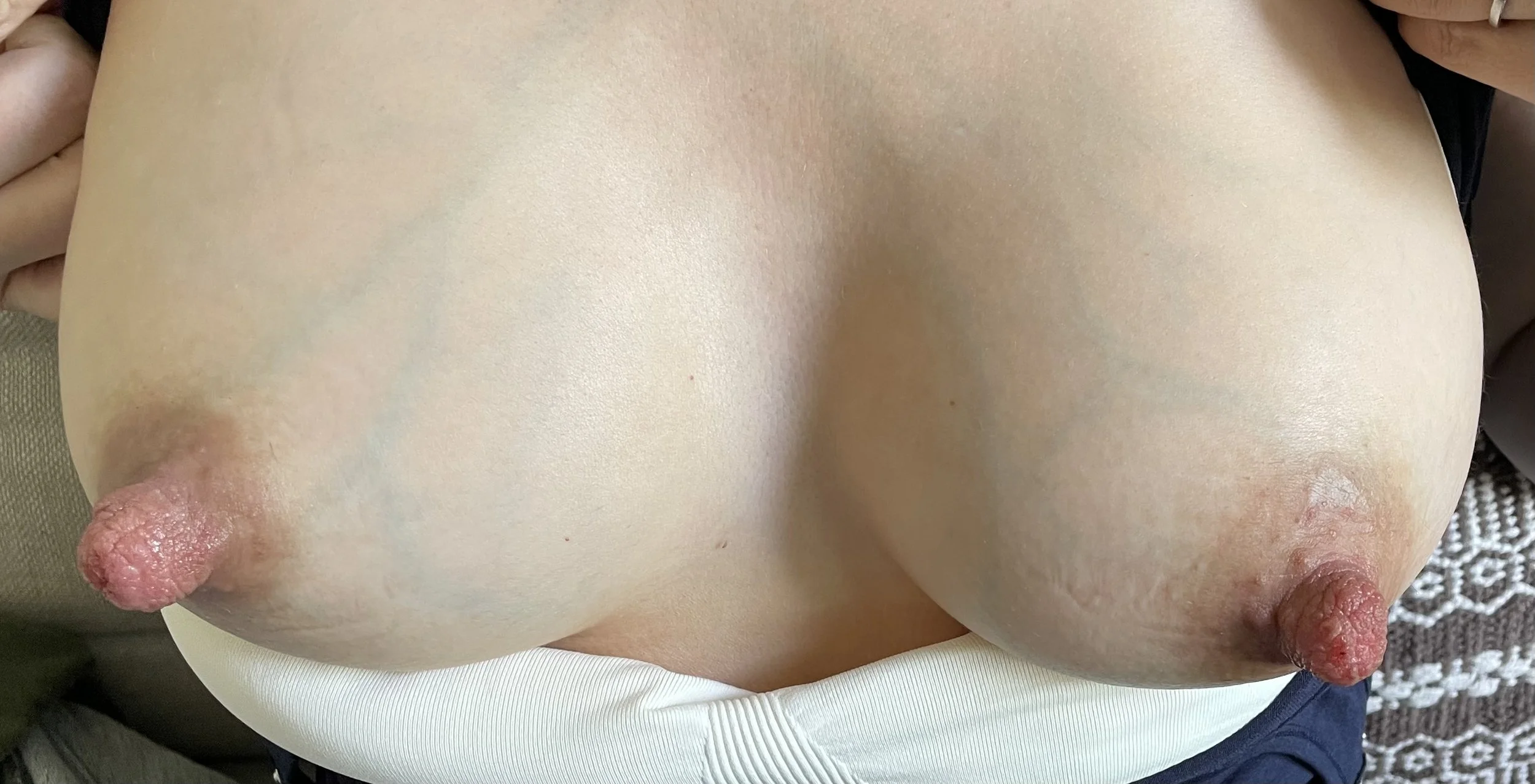Primary Engorgement
By Cordelia Uys, NCT Breastfeeding Counsellor
Just before your milk comes in, you may notice the veins on your breasts becoming more visible.
In this article we look at what happens when a new mother’s mature milk comes in, and how to manage the engorgement.
Colostrum
Pregnant women produce colostrum, mothers’ first milk, from half-way through their pregnancy:
https://www.cordeliauys.co.uk/what-is-colostrum
Colostrum is produced in small volumes, and is all babies need in the first few days. It’s the birth of your baby and the delivery of the placenta that tells your body to start making mature milk.
What do we mean by milk ‘coming in’?
Although mature milk production starts around 30 to 40 hours after a baby’s birth, mothers don’t usually feel their breasts becoming fuller until sometime between Day 3 and Day 4. With second and subsequent babies, mature milk tends to come in sooner.
Some women will notice their breasts suddenly become much larger and firmer; for others it’s a more gradual process. All new mothers will find that their breasts increase in size considerably, as extra lymph fluid, and blood, flow to their breasts and they fill with mature milk.
Just before your milk comes in, you may notice the veins on your breasts becoming more visible.
How to minimise your chances of getting extreme engorgement
Breastfeed within 2 hours of your baby’s birth.
Breastfeed very often, especially in the first two or three days. It’s recommended to aim for 10 to 14 feeds (or more) in 24 hours. This will also be great for establishing your milk supply.
Avoid going longer than 3 hours between feeds.
Offer both breasts at each feed.
Make sure your baby is well latched and positioned and is transferring milk effectively. Ask for help if not.
Engorgement can be alarming
Having breasts that are painful, rock-hard, warm and tender, and which rival Dolly Parton’s, can come as a shock. Some women also experience painful swelling in the breast tissue under their armpits, and some develop a fever.
A perfect storm
The discomfort and increase in size tend to coincide with a cocktail of new-mum hormones coursing through your body, causing a rollercoaster of emotions. You will probably also be suffering from several nights of disrupted sleep, as well as starting to come down from the high you experienced when meeting your baby for the first time. Many women find themselves feeling tearful and overwhelmed.
Don’t panic
The good news is that for the vast majority of women, this period of emotional volatility and significant engorgement rarely lasts longer than 24 hours.
Your baby might suddenly not be able to latch
When engorgement sets in, it’s common for babies who were breastfeeding quite nicely suddenly not be able to latch. This is because the nipple and areola swell up so much that the nipple disappears, so for the baby it’s like trying to latch on to a pumped-up football.
How to relieve the engorgement
If normally tolerated, you can take ibuprofen.
Breastfeed as frequently as possible, aiming for every ½ to 2 hours during the day, and every 2 to 3 hours at night.
Between feeds
Apply cold compresses: 20 minutes on, 20 minutes off; this helps with the swelling.
To make compresses: take two clean nappies, pour cold water in them, place them in the freezer for an hour, and then apply one to each breast.
Before feeds:
Pour warm water in another clean nappy and apply to the breast you’re going to feed from for 2 minutes, but not more. This encourages the milk to flow.
Do 3 minutes of reverse pressure softening. https://www.cordeliauys.co.uk/reversepressuresoftening/primaryengorgement
Reverse pressure softening: place the tips of your index fingers and the tips of your middle fingers on each side of the base of your nipple, and press on your areola, so that your nipple stands proud. This is very effective at releasing pressure and should allow your baby to latch.
If your baby still can’t latch, gently hand express a bit of milk to relieve the pressure.
Gently massage your breasts during feeds.
Avoid Pumping
Lots of women are tempted to use a pump to relieve their engorged breasts, but this should only be done as a last resort if your breasts aren’t softening at all during feeds (or if your baby isn’t latching). Pumping will exacerbate the engorgement.
Your breasts will settle down
If your baby is nursing regularly and removing milk effectively, after a while, your breasts will no longer feel very firm all the time. After around 4-6 weeks, they may feel almost back to their pre-pregnancy softness, and you will only feel engorged if your baby suddenly goes longer than usual between feeds. This doesn't indicate a reduction in milk supply, it just means your breasts have learned to make exactly the right amount of milk for your baby.
Links:
https://www.laleche.org.uk/engorged-breasts-avoiding-and-treating/
https://kellymom.com/bf/concerns/mother/rev_pressure_soft_cotterman/
https://med.stanford.edu/newborns/professional-education/breastfeeding/hand-expressing-milk.html



